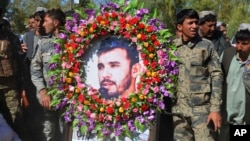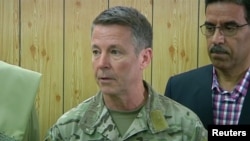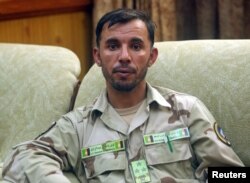Parliamentary elections in Kandahar province in Southern Afghanistan will be postponed for a week due to the situation arising from the killing of influential commander General Abdul Raziq, according to Haroon Chakhansuri, a spokesman for President Ashraf Ghani.
Elections across the rest of the country are scheduled to take place on Saturday, October 20.
The attack Thursday that killed Raziq was aimed at him and General Scott Miller, the commander of United States and NATO forces in Afghanistan, according to a Taliban statement claiming responsibility.
The U.S. commander, who was unharmed in the attack, refuted that claim.
"My assessment is that I was not the target. It was a very closed, confined space," said Miller in an interview with Afghan channel Tolo News Friday as he walked the streets of Kabul and checked on Afghan security forces' election readiness.
"What happened down there was an attack on the security forces. But I'll tell you that we'll remain with the security forces," he added.
Miller was in Kandahar for high level meetings with provincial officials on the upcoming elections.
In a brief message Thursday evening, President Ghani promised the situation in the province would soon return to normal.
Rehmatullah Atrafi, security officer in charge for Kandahar province, said Raziq's youngest brother, Tadeen Khan Achakzai, has been appointed as the new police chief in Kandahar, on special orders from the president.
However, the death of what many called one of the most powerful and influential men in Southern Afghanistan is likely to change both the political and security makeup of the region.
"It's going to have a significant impact on the whole security balance in southern Afghanistan, but particularly Kandahar," said Mushtaq Rahim, an independent political analyst based in Kabul. "He was able to maintain the security presence of the Afghan government on the outskirts of the city and even in faraway areas."
Raziq was known as the man who had kept Taliban at bay in Kandahar, in a country where the insurgency seems to be slowly gaining ground elsewhere.
A New York Times story in 2014 called him the man who "put fear in Taliban and their enemies."
Locals regarded him as larger than life, and as someone who had brought a semblance of stability to their lives. Human rights activists on the other hand, often accused him of abuses.
The United Nations Committee against Torture in a report last year noted "numerous and credible allegations" that Raziq was "widely suspected of complicity, if not of personal implication, in severe human rights abuses, including extrajudicial killings and … secret detention centers." The committee called for Raziq and other Afghans involved in such practices to be duly prosecuted and punished.
However, his gains against the Taliban kept him in the good books of American commanders who often worked closely with him.
"Today I lost a great friend LTG Raziq. We had served together for many years. Afghanistan lost a patriot, my condolences to the people of Afghanistan. The good he did for Afghanistan and the Afghan people cannot be undone," Miller tweeted from the account of Resolute Support, NATO's mission in Afghanistan.
Raziq had survived multiple attacks on his life from Taliban. His killing is the latest in an election season already marred by bloodshed. Ten candidates have been killed since the start of the nomination period in late May, along with dozens of their supporters. The Taliban announced they would derail the election process by any means possible.
Even though the insurgency has called on its followers to safeguard civilian lives, it has simultaneously encouraged them to attack schools that will become polling stations, or any election related activity.
The United Nations Mission in Afghanistan has called on the Taliban to respect civilian life and fulfill their commitments under international law. "Civilians working in or attending polling stations cannot under any circumstances be regarded as military targets," a UNAMA statement said.
U.S. Ambassador to Afghanistan John Bass said the Taliban have repeatedly announced that they want to avoid civilian casualties and that it was time to demonstrate their seriousness.
"Elections are a central piece of what civilians in a democratic society participate in and they should be able to do so without fear of violence or intimidation or disruption," he said while addressing a group of Afghan journalists.






